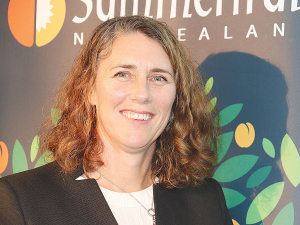New Summerfruit NZ CEO
Dean Smith has been in the role of CEO of Summerfruit NZ for about four months, having succeeded Kate Hellstrom at the end of September.
 Summerfruit NZ chief executive Kate Hellstrom says the weather has delivered different experiences to different regions.
Summerfruit NZ chief executive Kate Hellstrom says the weather has delivered different experiences to different regions.
The La Nina weather pattern has played a role in determining the fortunes of the summerfruit sector this season.
Chief executive of Summerfruit NZ Kate Hellstrom says the weather has delivered different experiences to different regions. This has meant that cherries have done well in the South Island, while the cherry and stonefruit crop in Hawkes Bay has been severely impacted.
She told Hort News the La Nina reduced sunshine hours leading up to the harvest in Hawkes Bay resulting in the yield being significantly down on previous years.
“Yields in some cases there are 50% down on the previous year with low sunshine hours and wet weather taking their toll on the crop,” Hellstrom explains.
“For most Hawke’s Bay growers, it will be a tough financial year. Because of the weather there have been less early apricots in supermarkets this year.”
She says Blenheim also had a pretty wet time leading into their harvest. Hellstrom adds that the financial problems have been compounded by increasing labour and logistic costs.
But in the South Island the weather has favoured growers with good yields and high quality fruit coming off the trees. Cherries are the main summerfruit export crop and Kate Hellstrom says it’s been a good year for growers.
“Although forecasting is quite challenging because there are so many variables, our pre-season forecast estimated a 5,000 tonne cherry crop,” she told Hort News. “Last year, we had 3,200 tonnes of export cherries – so that would be quite an increase if in fact it does play out as predicted.”
Hellstrom says the season in the south was delayed slightly by the weather and it was a ‘bit of rush’ getting cherries to China for the Chinese New Year. But she says the climatic conditions in Central Otago in January were really good with hot dry weather, which is ideal for the harvest.
She adds that cherry growers are still seeing the effects of the Covid lockdowns in China, which means that people are consuming fewer cherries than would normally be the case.
Hellstrom says this has meant that exporters have had to diversify into other markets and keep positioning the NZ cherries as a premium product. Taiwan is NZ’s main cherry market and China is number two.
“We do rely on airfreight for cherries with sea freight being pretty challenging because of the shelf life of cherries,” Hellstrom explains. “Despite all the challenges, cherry exporters have been able to get their fruit away but this is because they all worked together.”
She says while there are still logistical challenges the situation has been better than previous seasons because there have been more flights coming in and out of NZ.
“But there is still that global supply chain issue that is lingering post Covid and I think it will take another few years to sort that out,” Hellstrom adds.
Back in the South Island, the stone fruit harvest is beginning in Central Otago and Roxborough.
Hellstrom says the fruits look really good quality wise and the weather is holding out nicely. She says while there is still a lingering labour shortage, the good news is the return of the backpackers from overseas and the recovery of the tourist industry in the South Island.
Strong farmgate milk price is helping boost investment on farms, says PGG Wrightson chief executive Stephen Guerin.
Fonterra's 460 milk suppliers in Australia, who will switch to Lactalis end of this month, are unfazed with the impending change.
The 5+ A Day Charitable Trust has launched a collection of affordable recipes designed to turn everyday vegetables into seasonal stars.
Jane Mellsopp has been confirmed as the new Government Appointee to the New Zealand Meat Board (NZMB).
To celebrate the tenth anniversary of its annual Good Deeds competition, Rabobank will give away $100,000 to improve rural community hubs, schools, clubrooms, and marae across New Zealand.
Agricultural and veterinary product supplier Shoof International has appointed Michaela Dumper as its new chief executive.

OPINION: A mate of yours truly reckons rural Manawatu families are the latest to suffer under what he calls the…
OPINION: If old Winston Peters thinks building trade relations with new nations, such as India, isn't a necessary investment in…